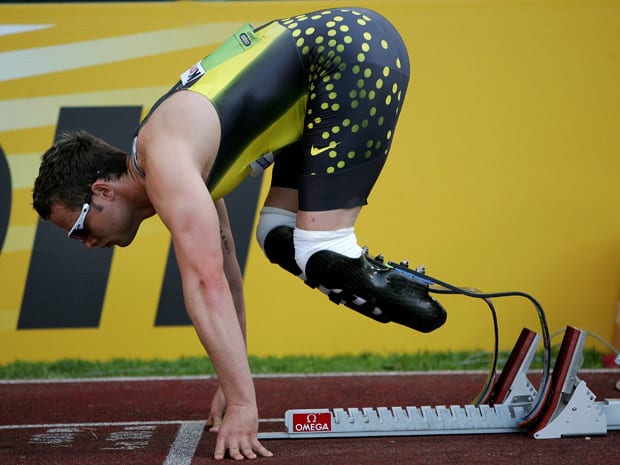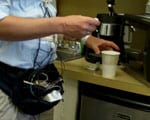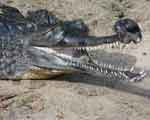Book a live interview

To book a live or taped interview with Peter Weyand in the SMU News Broadcast Studio call SMU News at 214-768-7650 or email news@smu.edu. |
Related links
- Peter Weyand
- Journal of Applied Physiology: “The biological limits to running speed are imposed from the ground up”
- Annette Caldwell Simmons School of Education & Human Development
More SMU Research news
Canada’s National Post newspaper quotes SMU’s Peter Weyand, an expert in human locomotion, in an Aug. 8 article “Five things: The trials and tribulations of Oscar ‘Blade Runner’ Pistorius”
The Post article examines the controversy surrounding double-amputee sprinter Oscar Pistorius. Preparing now for the 2012 London Olympics, the 24-year-old South African once again is under the spotlight for his controversial carbon-fiber prosthetic legs that attach just below his knees.
Weyand is widely quoted in the press for his expertise on human speed. He led a team of scientists who are experts in biomechanics and physiology in conducting experiments on Oscar Pistorius and the mechanics of his racing ability. Pistorius has made headlines worldwide trying to qualify for races against runners with intact limbs, including the Olympics.
Weyand is an SMU associate professor of applied physiology and biomechanics in the Annette Caldwell Simmons School of Education & Human Development.
EXCERPT:
National Post
South African double amputee Oscar Pistorius was chosen to run in the 400 metres and 4x400m relay at the world athletics championships later this month. Here are five things to know before the big race in Daegu, South Korea.1. His legs are better than your legs
Known as the ‘Blade Runner’ and the ‘Fastest man with no legs,’ Pistorius had both legs amputated below the knee for medical reasons when he was 11 months old.He uses high-tech carbon-fibre blades in competition, with spikes on the forefoot for the track. The International Association of Athletics Federations (IAAF) began to monitor his races in the 2007 to analyze his technique and determine if he had an advantage.
“The company does make bionic feet that have hydraulics and are battery powered but this is a passive foot,” Pistorius told the Daily Telegraph in 2007. “That means that the output energy is not as much as the input energy so it definitely does not give me an unfair advantage.”
2. But they don’t come cheap
In a 2007 Wired feature on Pistorius’ attempt to qualify for the 2008 Olympics, the magazine says each leg costs between $15,000 (US) and $18,000 (US). It’s a small price to pay for an Olympic dream, considering the custom-made Cheetah Flex-Foot blades are made to look like human legs.It also explains why Pistorius insists on taking the prosthetic legs in his carry-on luggage when he flies, especially after one incident in the United States. “I went to run in Atlanta and my legs ended up in Salt Lake City,” he tells the Telegraph.
3. He’s had trouble with the IAAF
Pistorius first competed against able-bodied athletes in 2007 but the IAAF then amended its rules to ban the use of “any technical device that incorporates springs, wheels or any other element that provides a user with an advantage over another athlete not using such a device.”In the following year the world governing body said scientific research had shown Pistorius enjoyed an advantage over able-bodied athletes and banned him from competitions held under their rules.
However, the decision was overruled by the Court of Arbitration for Sport, making Pistorius eligible for the 2008 Beijing although he was unable to qualify for the South African team, winning gold medals instead in the Paralympic 100, 200 and 400 meters.
4. And then there’s the ’10-second advantage’
The question of whether Mr. Pistorius’ artificial limbs artificially enhance his running speeds is a matter of scientific disagreement. Two researchers who studied Pistorius, Drs. Matthew Bundle and Peter Weyand, conclude that his artificial limbs enhance his sprint running performances by 15-30% over his intact limb competitors. Their findings were published in the Journal of Applied Physiology in 2009.SMU is a nationally ranked private university in Dallas founded 100 years ago. Today, SMU enrolls nearly 11,000 students who benefit from the academic opportunities and international reach of seven degree-granting schools. For more information see www.smu.edu.
SMU has an uplink facility located on campus for live TV, radio, or online interviews. To speak with an SMU expert or book an SMU guest in the studio, call SMU News & Communications at 214-768-7650.

By Margaret Allen
Senior research writer, SMU Public Affairs
View Archive →
 Canada’s National Post newspaper quotes SMU’s
Canada’s National Post newspaper quotes SMU’s 






